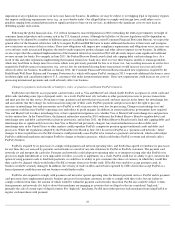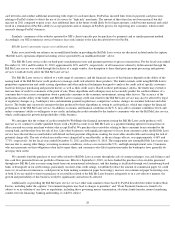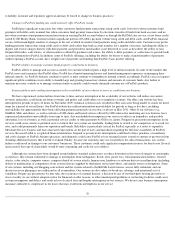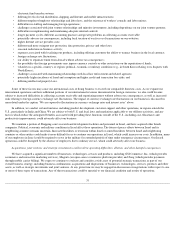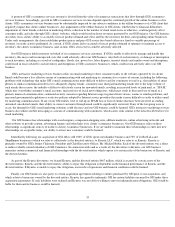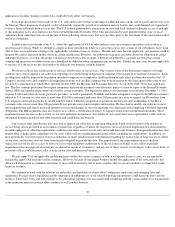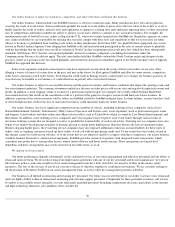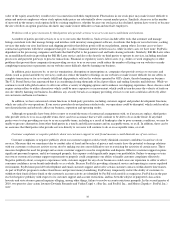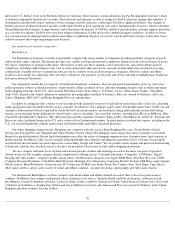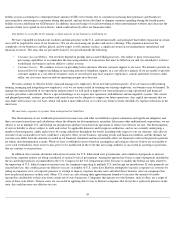eBay 2011 Annual Report Download - page 39
Download and view the complete annual report
Please find page 39 of the 2011 eBay annual report below. You can navigate through the pages in the report by either clicking on the pages listed below, or by using the keyword search tool below to find specific information within the annual report.
Our business and users may be subject to sales tax and other taxes.
The application of indirect taxes (such as sales and use tax, value-added tax (VAT), goods and services tax, business tax and gross receipt
tax) to ecommerce businesses such as eBay and to our users is a complex and evolving issue. Many of the fundamental statutes and regulations
that impose these taxes were established before the adoption and growth of the Internet and ecommerce. In many cases, it is not clear how existing
statutes apply to the Internet or ecommerce. In addition, some jurisdictions have implemented or may implement laws specifically addressing the
Internet or some aspect of ecommerce. For example, the State of New York has passed legislation that requires any out-of-state seller of tangible
personal property to collect and remit New York use tax if the seller engages affiliates above certain financial thresholds in New York to perform
certain business promotion activities. Several ecommerce companies are challenging this new law. In June 2011, California enacted legislation
(ABx1 28) that requires certain out-of-state retailers to collect and remit California use tax on taxable sales to California purchasers when the
retailer has a relationship with a person in California that refers customers to the retailer. In September 2011, the California Governor signed into
law AB 155, which supersedes ABx1 28 and delays the implementation of such collection and remittance requirements until September 2012 or
January 2013 (depending on whether or not the U.S. Congress enacts legislation in this area). The new California law is similar to the law passed
in New York, but provides exclusions for certain forms of Internet marketing and is limited to retailers who exceed prescribed sales volume
thresholds. However, if our sellers who are not already required to collect California sales or use tax believe that their use of our websites requires
them to collect California use tax, they may elect to limit their use of our websites rather than collect the tax, which would harm our business.
North Carolina, Rhode Island, Illinois, Arkansas and South Dakota have also enacted similar laws related to affiliates, and a number of other states
appear to be considering similar legislation. The adoption of such legislation by states where eBay has significant operations that perform certain
business promotion activities could result in a use tax collection responsibility for certain of our sellers. This collection responsibility and the
additional costs associated with complex use tax collection, remittance and audit requirements would make selling on our websites less attractive
for small business retailers, and would harm our business.
The State of Colorado has enacted legislation that takes a different approach by imposing a set of use tax notice and reporting requirements
(but not the actual tax collection responsibility) on certain retailers with no physical presence in Colorado. The law is designed to aid Colorado in
collecting use tax from Colorado residents who purchase taxable items from out-of-state retailers. The regulation promulgated by the Colorado
Department of Revenue excludes from these reporting obligations businesses that sell $100,000 or less into the state in a calendar year, thus
limiting the impact on our sellers. The law has been challenged in Federal Court by a number of out-of-state retailers and a Federal District Court
has issued an injunction blocking enforcement of the regulations pending a resolution of the case. Oklahoma has enacted a similar law. While the
recent laws in New York, North Carolina, Rhode Island, Illinois, Arkansas, South Dakota, Oklahoma and Colorado do not specifically apply to
our business, the proliferation of such state legislation, to expand sales and use tax collection on Internet sales, could adversely affect some of our
sellers and indirectly harm our business.
In conjunction with the Streamlined Sales Tax Project — an ongoing, multi-year effort by U.S. state, and local governments to require
collection and remittance of remote sales tax by out-of-state sellers — S. 1452 and H.R. 2701, U.S. Senate and U.S. House versions of the Main
Street Fairness Act, have been introduced in the 112
th
Congress. These measures would allow states that meet certain simplification and other
standards to require out-of-state sellers to collect and remit sales taxes on goods purchased by in-state residents. Sellers meeting an as yet
undefined small seller exception would be excluded from the requirements of the Act. Other legislation introduced in the US Congress, including
H.R. 3179 and S. 1832, would grant states the authority to require out-of-state retailers to collect and remit sales taxes without requiring the state
to join the Streamlined Sales Tax Project. The adoption of remote sales tax collection legislation that lacks a robust small business exemption
would result in the imposition of sales taxes and additional costs associated with complex sales tax collection, remittance and audit compliance
requirements on our sellers. This would make selling on our websites less attractive for small retailers, and would harm our business.
From time to time, some taxing authorities have notified us that they believe we owe them certain taxes. In May 2008, the City of Chicago
notified both eBay and StubHub that they are liable for a city amusement tax on tickets to events in Chicago, irrespective of the location of the
buyer or seller, and filed suit to enforce collection of taxes it claims are due. In March 2009, the court ruled that StubHub is not required to collect
and remit the city amusement tax. The City of Chicago requested reconsideration of this ruling and StubHub sought clarification of the ruling
relative to the remaining counts as well. In August 2009, the court entered a final order dismissing the case against StubHub. In December 2009,
the court also dismissed the case against eBay. The City of Chicago appealed both matters to the Seventh Circuit Court of Appeals. The Seventh
Circuit has issued an opinion in the StubHub matter rejecting the federal arguments advanced by StubHub and certifying the state law arguments
to the Illinois State Supreme Court. In October 2011, the Illinois Supreme Court ruled that state municipalities may not require electronic
intermediaries such as StubHub to collect and remit amusement taxes on resold tickets. The City of Chicago has requested a rehearing before the
Illinois Supreme Court and the court has not yet ruled on that request. The
34





